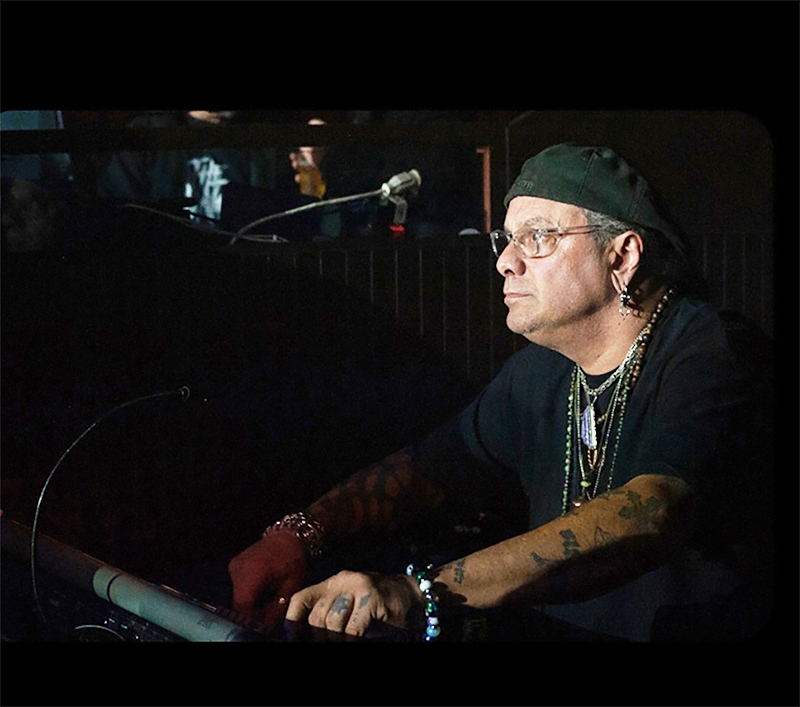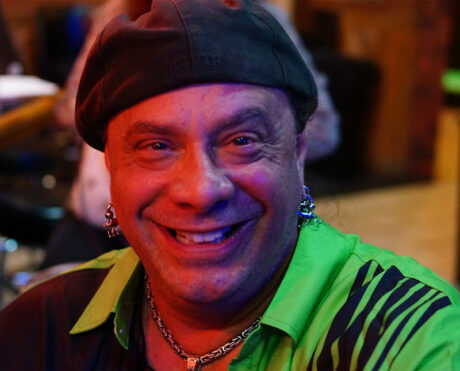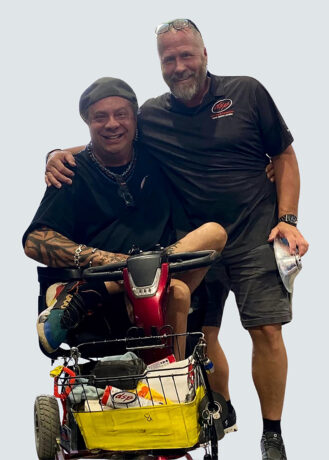
Rich Barrett/Quinn is the Head Lighting Designer and Programmer for Deep South Productions in Sulphur, LA. He’s been working in the industry for over 35 years and even though has been diagnosed with terminal Amyotrophic Lateral Sclerosis (ALS), he continues to share his passion for the industry, finding ways to motivate and mentor early career people, and inspire his colleagues in the DSP shop.
Barrett/Quinn got into the business “by accident” and with a white lie. While he was going to college in Houston, TX, he worked as a barback to pay the bills. One night one of the artists playing the bar had no one to run their lighting console. When asked if he could run it, he lied saying, “Yes, I can.” After jumping into the deep end, and faking his way through that first show, he found he really liked lighting. He had a natural feel for color, meter, tempo, anything to do with music. Over his career, he’s worked with a range of artists in a range of genres including Tejano, R&B, rock ‘n’ roll, country, and jazz. He has also lit five U.S. Presidents, and even has White House clearance. He recently spoke with PLSN about what he’s learned in his career, and what he’d like to tell the early career people trying to get a foothold in the industry.

What were some of your steps in coming up the ladder in the business?
I was working around doing lighting for all different things, and I realized there’s money in this if you own your own equipment. I had two friends that decided they wanted to give it a shot, so we started a lighting company in ’93—Illuminations Unlimited. We did regional stuff—Texas, Oklahoma. A lot of 90s rock; we cornered the Tejano market with Selena and Emilio. We did a lot of diverse things. We did that for a few years then it faded. I thought about getting out of the industry after we sold the business. Then I was doing casino shows in ‘99, which were blowing up in Louisiana. I met Marvin Simon, who owns Deep South Productions, and his people were my labor for shows at a casino. At the time he was an audio-only company, but he saw the future was in having lighting. I have to give Marvin props, because he had the vision as an owner to take risks on something he had no idea how to use. He wanted me to help him develop a lighting department. I told him I’d get back to him with an answer. He waited about six weeks and called me up saying he really wanted me to come to work for him. It was a risk for both of us. We started in ’99, 2000 and took off buying lights and started doing moving lights for events successfully. Fast forward to 2024, and Deep South is a massive lighting company—we now have over 3,000 moving lights. We also have a huge audio department and a video department. I am proud to have been directly responsible for creating the monster that is the Deep South lighting department.
Is there a piece of advice you’d share with someone starting out in the business?
Learn it all. Be prepared for any situation. Also, do not think you’re going to be the star. An LD can make, or break a band, but you’re only going to sting them once and they’ll find somebody else. And pay attention to the details. I have one trick that I was taught. On my lighting plots, I always take one light and hang it upside down. It’s like Van Halen’s ‘No brown M&Ms’ in their rider. I just want to make sure somebody was reading my plot, and they question that ‘mistake.’ It’s one little trick that gives me a sense of comfort that they have read the plot.
Talk about the importance of the mentoring relationship in a shop environment.
I think it’s vitally important because you are trying to convey knowledge. But you also have to convey the knowledge in a way you would talk to your 16-year-old son, you can’t be overly forceful. The tone of your voice has to be different. I went through hell and back to get to where my career is, and I want to share what I learned. I feel I’ve always tried to be a good teacher. I have a saying, ‘the dumbest question is the one not asked,’ because if you don’t ask me and we go to a show, and you screw something up, that’s on you. It is important when you’re in a shop environment to be able to be as open and approachable as possible and for people to feel they can ask you questions.
A shop is a great place to learn it all, really learn your craft. The old guys used to call me ‘new school.’ Now I don’t know what I am, but yeah, the joke after a while was you were middle school, you could do both old and new school stuff. That is important, and not enough people learn the old school to understand the new school stuff. There’s not many of us left in this industry that are capable of doing all facets. When I came off the road, I said, ‘you know what? I’m going to really learn this craft.’ I wanted to learn how to rig. I wanted to learn how to do electrical work. I wanted to learn how to draw plots. I wanted to learn CAD, which was a lot cruder back when I started.
You have to know that this is an ever-evolving business, and you need to evolve with it, but to do that you need to know your craft. Today, too many people starting want to be the top dog. They don’t want to get dirty; they don’t want to learn it all. They want to go right to being a programmer or a designer. That is great as a goal, but you have to start by pushing cases. Start working in the shop, learn, and work your way up. I believe in an apprentice style of work. People jumping over the basics and not learning the foundation is going to come back to bite the industry in the ass because everybody and every step has a purpose. That is the uniqueness of working in a shop. You have got to really know how to work with all those other departments, and at the end of the day, we’re all trying to put on a show. If somebody’s falling behind, you’ve got to help pick up the slack no matter if it’s not your department, you all need to build the video wall. You learn that working those skills and that attitude working in a shop.

Even though you are dealing with having ALS, you still want to work and keep contributing to the industry. That is inspiring.
I’m in hospice care, but I still talk to the office every day as a consultant. I have to keep my brain busy. My doctor told me, my body is going to stop, but the day you stop staying involved in what you love to do and what you’re very good at, is the day you’ll curl up in a ball and die. My daughter drives me to the office to visit, but it is a two-hour drive that is really taxing for me now. But there’s a lot of things that I really need to go in and close out with the people at the shop. Tell them one-on-one. Marvin has been really rock-solid. He and everyone at Deep South, if I ever need anything, all I need do is ask them.
So, yeah, my approach is that every day I open my eyes is a good day for me, brother. I’m pretty far down the path with this now, but people need to understand that if I’m willing, in my situation, to invest what time I have left in something that I truly love and I am passionate about, the least they can do is get out of bed and learn how to program a cue differently on a desk. I would like to inspire people, and if I can use my situation as a tool to motivate people, that would be great. New people, kids as I call them, need to know that life in this industry is a commitment. I love and am passionate about this industry, and I want the kids in the industry to build that same passion. But it takes a lot of hard work to be in this industry. I know I’m dying, but I’m still committed to doing it. If people commit to going in and doing a good hard day’s work, I promise it is really rewarding.


